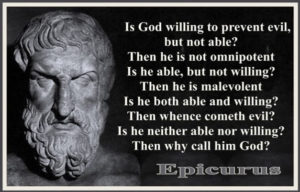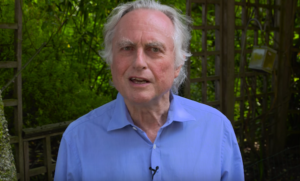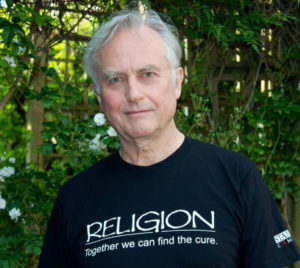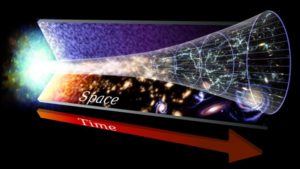 In part one, we examined the scientific and philosophical rationale that supports God as the cause of the universe. However, since there are many intelligent, rational, scientific atheists, one may suppose that the case is hardly undeniable. And as you would assume, there are many responses provided by naturalists to refute the Cosmological Argument. So we will look at the primary arguments and assess their validity. In the end, it will be clear that God remains not only the most reasonable explanation for the universe, but the only intellectually honest option. Continue reading
In part one, we examined the scientific and philosophical rationale that supports God as the cause of the universe. However, since there are many intelligent, rational, scientific atheists, one may suppose that the case is hardly undeniable. And as you would assume, there are many responses provided by naturalists to refute the Cosmological Argument. So we will look at the primary arguments and assess their validity. In the end, it will be clear that God remains not only the most reasonable explanation for the universe, but the only intellectually honest option. Continue reading
Author Archives: Scott Dunkley
Cosmological Argument – Part I
Read Part II here
Two of the most effective evidences for the existence of God are the Cosmological and Teleological Arguments. Logic and Light has touched on both of these in earlier posts, but it is important to look at each one specifically to fully understand their strength, and to refute the counter-claims of those that reject them. So, over a series of articles, Logic and Light will explore these two arguments, starting with the Cosmological. Continue reading
The Problem of Evil
 The “Problem of Evil” is one of the biggest philosophical challenges to a belief in God and is a major contributor to the rejection of Christianity. In fact, well-known biblical scholar and critic Bart Ehrman credits the problem of evil with his own loss of faith. We’ve addressed this topic in an earlier article, but a more comprehensive response is appropriate. The problem can be simply stated as follows:
The “Problem of Evil” is one of the biggest philosophical challenges to a belief in God and is a major contributor to the rejection of Christianity. In fact, well-known biblical scholar and critic Bart Ehrman credits the problem of evil with his own loss of faith. We’ve addressed this topic in an earlier article, but a more comprehensive response is appropriate. The problem can be simply stated as follows:
- If God is all-good, He would want to destroy evil
- If God is all-powerful, He could destroy evil
- Evil exists
- Therefore, an all-good, all-powerful God does not exist
The logic seems sound on the surface. But can these really be our only options? Clearly, the problem of evil presents believers with a dilemma. Or does it? Continue reading
How Could God Become a Man?
Christmas is the time of year when Christians celebrate the birth of Jesus, who they believe is the Messiah (or savior, literally “anointed one”) predicted in the Old Testament. According to Christian orthodoxy, Jesus is actually God incarnate. The doctrine of God becoming human is very clear throughout both the Old and New Testaments (e.g. Isaiah 9:6, Isaiah 7:14, John 1:1-3, John 1:14, Colossians 2:9, Hebrews 1:3, John 20:28).
Many non-Christians question how or if God could become a man. They have many good questions related to this such as: How is it possible for an infinite God to become a finite person? How can God be two people at the same time? Did He stop being God while He was a man? Why would God do this in the first place? As we approach Christmas, it is appropriate to reflect on these questions and “always be prepared to give an answer” to those who may ask why we believe what we do (1 Peter 3:15). Continue reading
Dawkins’ Delusions: Part IV
 Here, we conclude our four-part chapter-by-chapter response to Richard Dawkins’ The God Delusion.
Here, we conclude our four-part chapter-by-chapter response to Richard Dawkins’ The God Delusion.
Links to other installments: Part I, Part II, Part III
Chapter 8 Summary
Chapter 8 is Dawkins’ argument for why religion is not just something we should dismiss and ignore but rather actively oppose. Religion is not just wrong, it’s dangerous. Continue reading
Dawkins’ Delusions: Part III
 Here, we continue with our four-part chapter-by-chapter response to Richard Dawkins’ The God Delusion. This is part III.
Here, we continue with our four-part chapter-by-chapter response to Richard Dawkins’ The God Delusion. This is part III.
Links to other installments: Part I, Part II, Part IV
Chapter 5 Summary
In chapter 5, Dawkins seeks to answer how “the anti-factual, counter-productive fantasies of religion” could have developed so universally among mankind from a Darwinian, evolutionary perspective. After discussing a few theories, Dawkins leans toward the idea that religion did not evolve because it was beneficial, but rather as a by-product of some other characteristic that contributed to survival. Continue reading
Dawkins’ Delusions: Part II
 Here, we continue with our four-part chapter-by-chapter response to Richard Dawkins’ The God Delusion. This is part II.
Here, we continue with our four-part chapter-by-chapter response to Richard Dawkins’ The God Delusion. This is part II.
Links to other installments: Part I, Part III, Part IV
Chapter 3 Summary
The purpose of chapter 3 is to disprove the various arguments in favor of God’s existence. Dawkins addresses Thomas Aquinas’ five proofs, the ontological argument, and various arguments from beauty, personal experience, scripture, and admired religious scientists, along with Pascal’s Wager, and Bayesian probabilities. Continue reading
Dawkins’ Delusions: Part I
Links to other installments: Part II, Part III, Part IV
Part 1: Introduction
 Richard Dawkins is perhaps the most well-known of a new generation of activist atheists that includes Daniel Dennett, Sam Harris, and the late Christopher Hitchens. The God Delusion is his attempt to disprove the “God Hypothesis” and he hopes that “religious readers who open it will be atheists when they put it down.”1.
Richard Dawkins is perhaps the most well-known of a new generation of activist atheists that includes Daniel Dennett, Sam Harris, and the late Christopher Hitchens. The God Delusion is his attempt to disprove the “God Hypothesis” and he hopes that “religious readers who open it will be atheists when they put it down.”1.
With over 3 million copies sold, The God Delusion is probably one of the most widely read and influential atheist manifestos available. It’s definitely not a new book. However, we felt compelled to address it because it has been so widely read and because its arguments, even though they are poorly constructed, continue to influence people. Continue reading
“How can Jesus be the only way to salvation?”
 As we covered in another article, it is popular today to believe that multiple religions offer equal access to God. Consequently, many people question whether Christianity can really be the only way to experience salvation. Christians are often thought of as narrow-minded or self-righteous for believing that their religion is the only “right one.”
As we covered in another article, it is popular today to believe that multiple religions offer equal access to God. Consequently, many people question whether Christianity can really be the only way to experience salvation. Christians are often thought of as narrow-minded or self-righteous for believing that their religion is the only “right one.”
Ultimately, “Is Jesus the only way to salvation?” is a very important question that Christians and non-Christians should ask. But how should we go about finding the right answer? Continue reading
The God of the Gaps – “Hasn’t Science Shown that God is Not Necessary?”
 One of the most common objections to the existence of God is that it is simply unscientific. A belief in God is just an ignorant relic of the past, when more primitive people invoked the names of various gods to explain the things they didn’t understand.
One of the most common objections to the existence of God is that it is simply unscientific. A belief in God is just an ignorant relic of the past, when more primitive people invoked the names of various gods to explain the things they didn’t understand.
In other words, “God” was simply something people used to fill a gap in their knowledge. But as we have learned more and become better educated, we have discovered natural causes to previously unknown phenomenon, leaving God fewer and fewer places to “hide.” Consequently, even the few remaining gaps that remain can no longer serve as an argument in favor of God, since history proves that they will eventually be filled with natural explanations, even if they are currently unknown. Therefore, we can finally lay this “god of the gaps” to rest. Continue reading


